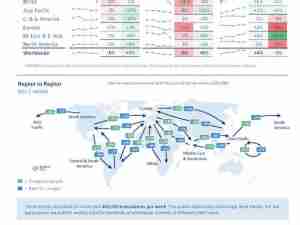Air France-KLM CEO Inherits Group in Turmoil as Dutch Stew
By: | Jul 04 2016 at 01:26 PM | Air Cargo
Jean-Marc Janaillac, Air France-KLM Group’s incoming chief executive officer, faces all of the same labor problems that bedeviled his immediate predecessor as well as one big new headache: an increasingly public schism between the carrier’s French and Dutch units.
Air France unions campaigning to block sweeping cost cuts have attracted the ire of their KLM counterparts, who are angry at the impact a succession of French strikes is having on a group that was formed via a merger in 2004. The two main units have never fully integrated to move beyond national sentiments, with the more efficient Dutch arm largely propping up the group.
Concerns that Air France’s woes could impact KLM’s operations entered the political arena last month. Ministers in the Netherlands warned Air France’s new management about pandering to the French arm’s powerful pilot lobby amid worries that a deal would crimp growth at KLM, which boasts much higher productivity levels.
With Air France-KLM 17 percent owned by the French state and Janaillac a close ally of President Francois Hollande, the Dutch are especially concerned that the former bus company boss will want to avoid confrontation with French unions ahead of 2017 elections in which his friend may stand for a second term.
‘Suspicion and Fear’
Temperatures are running especially high because aviation plays such a central role in the Dutch economy. KLM was Europe’s fourth-largest airline before it was bought by Air France, though located in a nation that ranks only 10th in the region by population. Its Amsterdam Schiphol base acted as a hub for inter-continental travel long before the Persian Gulf carriers hit on the idea.
Janaillac, at 63 fully 10 years older than Alexandre de Juniac, who he succeeds as head of Air France-KLM on Monday, says he’ll need until November just to understand what’s gone wrong at the company.
“By then he’s got to come out quickly with an analysis of where the airline stands and a plan to get everyone on the same page,” said Yan Derocles, an aviation analyst at Oddo Securities in Paris. “At KLM, where suspicion and fear are rife, he has to regain trust and rebuild a group spirit.”
Janaillac today told employees that “difficulties are great, and competition,” though said he was optimistic about the future given the power of Air France-KLM’s global network. Flicking at tensions, he urged employees to work together “beyond our differences,” promising to work in a spirit of “openness, transparency and dialog.” He’s scheduled to visit Amsterdam next week, the airline said in a text accompanying his video, published on YouTube.
Janaillac’ decision not to suggest plans for the restructuring of Air France until almost the end of the year may be an early sign that he’ll go easy on its pilots, who have been resisting attempts to recalibrate expenses since 2012.
Falling Behind
The delay means falling further behind IAG SA, which has successfully slashed costs at its British Airways and Iberia units, and Germany’s Deutsche Lufthansa AG, which is edging slowly toward a savings deal, not to mention the discount and Gulf carriers that are also eating away at Air France-KLM’s market share.
Janaillac, whose only hands-on aviation experience was in the 1990s at French regional carrier AOM, which later went bust, could be forgiven for avoiding a showdown. De Juniac, while shaving hundreds of millions of euros off costs in his three-year tenure, was forced by the government to step back in 2014 when pilots walked out over the use of low-cost arm Transavia to move flights outside France. The strike cost half a billion euros and de Juniac was forced to scrap the strategy.
The CEO’s situation weakened further last October when two senior executives were attacked during labor talks, fleeing with their clothes in tatters in scenes that were broadcast around the world and brought down ridicule on both Air France-KLM and the French state. An aide to French Prime Minister Manuel Valls was subsequently brought in to take charge of staffing issues.
‘Drifting Apart’
While de Juniac announced his resignation in May after accepting a new job as CEO of the International Air Transport Association, Air France pilots sent a message to the incoming Janaillac with a further four-day strike in June, prompting him to propose the cooling off period.
Pilots at KLM, by contrast, last staged a walkout in 1995, and said last month that their French counterparts had abused their labor rights by deliberately seeking to sabotage the Euro 2016 soccer tournament, which is being held in France, and to jeopardize future earnings.
“I truly regret that the strike took place,” Steven Verhagen, president of the Dutch VNV union, said in an open letter to French pilots on June 17, adding that he felt the French and Dutch unions were “quickly drifting apart.”
While KLM has generally been more profitable than Air France, with a 3.9 percent profit margin in 2015 versus 2.8 percent at its sister company, the Dutch arm remains very much the junior partner, heightening concerns that Janaillac will favor his countrymen.
“Giving in to the demands of French pilots, without any contribution from their end, would be a wrong sign both toward the French pilots and their Dutch colleagues,” Sharon Dijksma, the Netherlands’ deputy minister for infrastructure, said in a letter to parliament on June 13.
Amsterdam Mayor Eberhard van der Laan has gone further, telling newspaper Het Parool in February that a demise of KLM would relegate Schiphol to also-ran status and ultimately torpedo the entire Dutch economy.
“My biggest nightmare is that KLM will not survive, resulting in Schiphol not surviving as an international junction, resulting in Amsterdam not surviving,” he told the newspaper.
